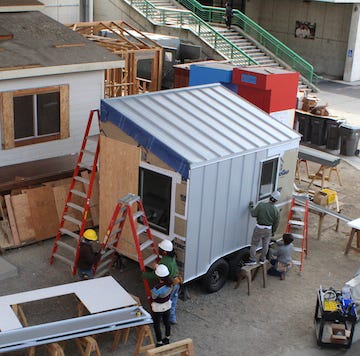by Yohana Gebre

The two tiny homes built by Laney’s carpentry department will remain unoccupied in the parking lot of West Side Baptist Church in Oakland until the church designs a system for housing two homeless Laney students.
The Tiny Homes, Model S (small) and Model M (medium), were built by Laney College students with the help of an $80,000 grant from the City of Oakland given to the college in 2016. City Councilmember and former Peralta Trustee Abel Guillén inspired Laney’s Carpentry Department to pursue the grant. The city agreed that Laney’s Carpentry Department would build the homes up to Oakland’s housing code, while the city would find residents to occupy them.
Oakland gave the seed money to the Peralta College Foundation so the Carpentry Department and Laney’s FabLab could build the homes for two local homeless residents.
The portable shelters were intended to serve as models for future homes. Both Tiny Home models are compact “pocket houses” on trailers, making them relatively easy to relocate. Model S is a studio with a desk, bed, and closet built on a 12-foot trailer. Model M has a full bathroom and kitchen, a desk, bed, and closet, on a 16-foot trailer.
Students began construction on Model M last April and finished October 2017. The construction for Model S started in November of 2017 and finished May 2018.
“There are laws, there are codes, there’s safety,” Reverend Ken Chambers of West Side Baptist Church said. They don’t want to rush into housing a student before completing the long list of details this project requires.
Rev. Chambers first heard about the Tiny Homes project from Reverend Jim Hopkins of Lakeshore Baptist Church and Guillén. The two men approached Rev. Chambers to see if he would be interested in hosting the tiny home at West Side church.
West Side Baptist Church was chosen to host the first tiny home in hopes that once the project was successful in housing and transitioning homeless students and homeless employed adults, the project could then branch out to aide more homeless people through the 200 plus churches in the Interfaith Council.
West Side Baptist Church is located near some of the largest encampments of homeless people in Oakland, on the 700 block on Willow St. in West Oakland.
Rev. Chambers wants to mass produce the tiny homes, but Laney has no connections with the church and the idea is still being explored, Laney President Tammeil Gilkerson said.
With both Tiny Homes delivered to West Side Baptist Church, the Carpentry Department feels they have completed their side of the contract.
“We were really only doing the labor,” Carpentry Department Chair Cynthia Correia said. She added that the carpentry department didn’t have any say in the policy-making process, only how the homes were going to be built.
Laney’s carpentry department designed the tiny homes to meet Oakland housing codes and regulations, creating a model that could be mass-produced. However, the department would not be able to manufacture homes for all of the 2,700 currently unhoused Oaklanders.
“Laney isn’t a production facility,” Peter Crabtree, the dean of career and technical education said.
The carpentry department wasn’t aware that Tiny Homes were potentially going to house Laney students.
The initial plan was to create tiny homes that would house two homeless individuals, Rev. Chambers said, but the idea of housing Laney students quickly came to my mind after speaking with Guillén.
Gilkerson said that once the Tiny Homes were built, it would be up to the church to fill them.
“The Tiny Homes are not our property…It is a community-based partnership in the sense of wanting to help facilitate an opportunity for our students,” Gilkerson said. “We will not be responsible for choosing students.”
Yohana Gebre is a staff writer at the Laney Tower.

























